British pop-punk band Neck Deep released their third studio album, “The Peace and the Panic,” on August 23 and it is easily one of this year’s best pop-punk albums. Compared to their overtly optimistic 2015 album “Life’s Not Out To Get You,” this third album places the naivety of optimism aside and uses a more realistic lense to figure out how to live the best life if death is the only guarantee.
Last fall, as Neck Deep was on tour with Pierce the Veil and I Prevail, frontman Ben Barlow abruptly exited the tour to return home in response to the news that his father, Terry Barlow, had passed away after years of sickness. The song “Candour,” from their first album, which was released in 2014, was about Ben’s fear of his father passing. When I read the “Alternative Press” article last October, I was quick to ignore the significance of the pain Ben must have been feeling and chose to focus on how that pain would affect their next album. Used to the band’s light-hearted pop-punk nature, I hoped they would tap into darker genres with their third album and I was not disappointed.
I witnessed the early manifestations of “The Peace and the Panic” on Vans Warped Tour this summer. Neck Deep was among the few pop-punk acts on this year’s unusually hardcore- and metalcore-dominated set, and it was refreshing to end the twelve-hour day with some cheery pop-punk after being trapped in many sweaty, beer-infested mosh pits. In the weeks leading up to my Warped Tour date in July, Neck Deep released three singles, the first two being “Where Do We Go When We Go” and “Happy Judgement Day.”

These two singles were released on the first day of Warped Tour with accompanying videos that led the alternative music scene into mania. Although “Where Do We Go” sounds like a typical Neck Deep song, the lyrics aren’t naively positive like most tracks off of “Life’s Not Out To Get You,” and instead address the idea of making something of yourself before death takes it all away.
“I just want to get 1-up on life before it kills me,” sings frontman Ben Barlow, riffing on the “1-up” concept introduced by the Marios Bros. videogames, in which the players gain extra lives by collecting a type of rare green mushroom. Though 1-ups provide a valuable benefit to the players, they are often only found in risky places. In “Where Do We Go When We Go,” Neck Deep champions this idea, suggesting listeners takes risks to reach their full potential before life kills them off.
Of the two singles, “Happy Judgement Day” pleasantly surprised me and affirmed my hope that the band would venture outside of positively fueled pop-punk into darker musical avenues and concepts. The song is a commentary on the political state of the world and is almost satirical. It starts off with children chanting the melody “rain, rain go away,” but with a closer listen, I soon discovered they were actually saying, “pain, pain go away.” Barlow’s intention doesn’t seem to be serious, but instead, appears to be more of an attempt to poke fun at the ridiculousness of the political situation in the United States and the United Kingdom.
The band released one more song during Warped Tour, titled “Motion Sickness,” that contains the line from which the album title comes: “Between the peace and the panic, I can’t break up the static.” This song is the album opener and appropriately so, as it harbors the musicality of old Neck Deep, with the more intentionally realistic lyricism of new Neck Deep. Prior to the official release of the album a few weeks ago, the band released one more song, “In Bloom.” I doubt any of their fans expected this masterpiece of a single from a poppy punk band like Neck Deep, but music video for “In Bloom” has broken many release records for the band, gaining them nearly two million views on YouTube.
On August 23, the long-awaited album was released to the world of music and as I intentionally listened to each song off the record, I realized something important. Neck Deep had truly pushed themselves as musicians by bending their norm, inviting collaboration by encouraging every band member to write at least one song on the album. They delved into their personal genre preferences and incorporated the individual parts into a conglomeration of self-exploration, social commentary and reminiscence.
I have many favorites off of the album, but I think the most important song on this record is “19 Seventy Sumthin,’” which is Ben’s ode to his father and his family. The lyrics in the track grant the listener a remarkable overview of the purpose of the album as a whole. Ben takes the listener on a journey from his parents’ love story to the conception of he and his siblings, which is all sung to a bubbly guitar melody.
The song takes a somber turn, though, when the frontman talks about the day he found out about his father’s death and the painful days that followed. He closes the song with hopeful words directed at his mother, saying “Oh mother please don’t cry.. / I will hold you when you cry because that’s what he would’ve done / because that’s what family does.”
In search of his purpose after the death of the most influential person in his life, Ben finally discovers that family is among the many things to be cherished while living. Loss is a universal experience and death is the ultimate mutual experience, but realizing what is important while we’re here will help make the journey more bearable. Neck Deep realized exactly that with this record.

















